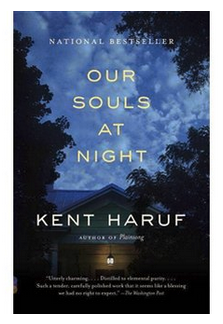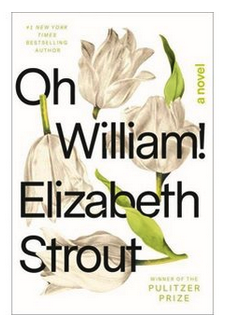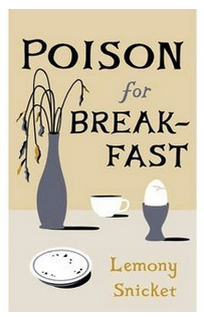I was on a real streak with books there for awhile, finding tons to bring home among the ones I was supposed to be re-shelving at work, and reading them one after another like sleeves of Thin Mints. After finishing Plainsong by Kent Haruf, I read Eventide and Benediction, both of which I liked—though neither as much as Plainsong. Eventide was a sequel, sort of, but it made me half-wish I’d stopped with the first book (though not really) (but sort of), and Benediction was not really a sequel, but only a book that took place in the same town, with some very light character overlap. Then I was reshelving Benediction (it is oddly pleasant to come upon my own returned books on the reshelving cart) and saw Our Souls at Night, another book by Kent Haruf, about two elderly acquaintances, both widowed, who begin having platonic sleepovers because nights are so lonely and difficult, which I thought I hadn’t read but it turned out I had, and I enjoyed re-reading it, though I felt the conflict was forced and required more justification, and shouldn’t have been written as if it’s a normal thing that happens. (And if it IS a normal thing that happens, then I am sad and outraged and I wish to find a solution.)
Now that I work at the library, I try not to take home New Releases, because New books are checked out more than any others, and once they are no longer New they tend to go dormant, which is when I will definitely see them and remember I want to read them; and Elizabeth Strout’s Oh William!, which I have been waiting to read, was moved off the New shelf AND was hanging out on the regular shelf (sometimes a non-New book has a long hold list so will still be absent from the library), so I checked it out, but first I re-read My Name Is Lucy Barton to remind myself of the gist (Oh William! is not exactly a sequel, but it is another book about the same woman), and also because My Name Is Lucy Barton is one of my favorite books, and I’ve read it at least three times, despite the title being so odd and unappealing to me (the title Oh William! is also odd and unappealing to me). Then I read Oh William! and liked that too—not as much as My Name Is Lucy Barton, but I don’t know if I liked My Name Is Lucy Barton the first time as much as I like it now. Oh William! is about an older woman and her relatively friendly relationship with her ex-husband, which is the sort of plot I like very much. My Name Is Lucy Barton is about the same woman when she is younger (though still an adult) (and married to William), and experiencing a lengthy hospital stay, and her mother comes to visit, and they chat about people they used to know; gradually these stories reveal the extreme dysfunction/poverty she grew up in, and you would not think I would like this book, considering I have said I will not even CONSIDER reading any more memoirs about people’s dysfunctional/neglected/abused childhoods, and yet here we are. Fiction is different; but also, this author does it in a way I can stand.
Let’s see, I think that is when I had three or four books in a row that I really disliked, and I persevered with each one for awhile because I really wanted the promised plot, but just could not chew through them. I don’t want the authors to search themselves online and end up here, but in case you are interested, one was emoC htiW eM by neleH namluhcS (I spent quite a chunk of time trying to decide if the order of the words should also be backward, and I still don’t know what’s right, likely because both ways are, clearly, wrong), which was supposed to be a book about getting to see what your life would have been like if you’d made different decisions, but I dragged myself through almost 50 pages and it just seemed like the author was trying very hard to be cool, and was doing that thing where there’s one line of a conversation, then two full pages of backstory, then another line of conversation, then two more pages of backstory, and can we just have the conversation and stop interrupting it? I also tried ehT repaP ecalaP by adnariM yelwoC relleH, which was supposed to be about a middle-aged married woman having a fling with an old crush, and I only got through 20 pages before realizing I hated everyone: all of the characters, the author, even the setting.
Those are just the two books I still have here at home; I can’t remember the others I tried and returned, but in any case I was starting to get worried. Did I not like books anymore? Would I read 20-50 pages of every book from now on? Well. On to the next one in the pile.
Poison for Breakfast, by Lemony Snicket (Target link) (Amazon link).
This was on my shelving cart, and I was surprised to see a book of adult fiction by a children’s-book author. I didn’t think I would want to read it, because I didn’t like the Series of Unfortunate Events books—though really that was an issue of plot and not style. But then I saw two things. On the front flap: “In the years since this publishing house was founded, we have worked with an array of wondrous authors who have brought illuminating clarity to our bewildering world. Now, instead, we bring you Lemony Snicket.” And on the back cover: “Some people might call Poison for Breakfast a book of philosophy, and hardly anyone likes a book of philosophy.” So I got it, because it is free to try books from the library and, since I work there, also very easy. It is a small book, and it is only 158 pages long, and there are illustrations, and in the back there are notes that include things such as “The author I said I would not identify is _____.” I think this book IS in some sense a children’s book; I can see how there may have been a struggle to decide how to publish it and where to shelve it. It is written simply, and with big words still defined as he does in his children’s books (“Sally’s suitor, whatever his name was, seems a bit impulsive, a word which here means ‘too quick to leave town just because Sally didn’t show up at a certain time'”). It feels as if the author is chatting to you: he mentions books he’s just thought of, and conversations he remembers, and why he likes specialty shops. There are little remarks phrased so simply and directly and purely, I had to stop, and blink, and wonder why I had never thought of saying it like that before—but that is the gift, to be able to say things that way, so that other people stop and blink and wonder why something so easy wasn’t easy to come up with themselves. There are little looping asides, where he reuses a word he defined earlier, as if trying to help you learn it. I was charmed by it all, and bewildered. I finished it and walked directly to my computer. If your library has it, I think you should try it, even if you don’t work there and so you have to make a special trip.




THERE IS A NEW ELIZABETH STROUT????
*runs off to buy copy*
I read Plainsong on your recommendation and really enjoyed it. I have Eventide waiting for me but maybe I should just skip it? I don’t know what would be best now…
Have you read Thursday murder club? I feel like you would love it.
Yes! I have the sequel on my to-read pile!
I’m partway through the audiobook now! I got it because of a recommendation here on Swistle’s blog, and I’m delighted to see there’s a sequel!
I worked in a library the summer after I graduated from high school and would sometimes be caught reading the books I was supposed to be shelving or boxing up. I imagine being an adult, you show more restraint.
I volunteered in my son’s elementary school library. There were many, many days where I did not get as much shelved as I should have because I was reading the books. In my defense, I love Mo Willems and my kids were “too old”, or so they claimed, for Mo Willems.
Have you ever read Marilynne Robinson? Based on the other things you’ve enjoyed, she seems like she’d be up your alley. My favorite is Housekeeping, arguably also the most famous. Then she has a series of related novels, usually called the Gilead novels, which I found uneven – some really satisfying and absorbing, but then they got less so as I read along. Just FYI: the Gilead novels have a Christian church at the center of the plot and all her work takes up ethical questions, but I wouldn’t classify her as a Christian author, FWIW.
YES—I just read Housekeeping recently! I liked a lot of things about it, enough to read the flaps of the other books on the shelf to see if I wanted to try another.
I just checkout out Oh William! last week and thanks to you just put in a request for Poison for Breakfast for online checkout. I love Kent Haruf enough that I watched the “Our Souls at Night” movie on Netflix. it was actually ok…frustrating in some of the same ways as the book. But, a relaxing enough winter movie to watch.
Have you read House in the Cerulean Sea?
Yes! I found it pleasant though sort of children’s-bookish.
I wonder whether the author of Our Souls at Night realised that Brits would snigger at the title upon hearing it (Brit for ‘asshole’ is ‘arsehole’, which sounds unfortunately close to ‘our soul’)
Yes! I had to read it to myself in an American accent to see how they could have missed that one.